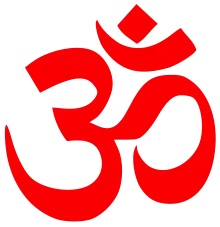Prarabdha karma
Prarabdha karma are the part of sanchita karma, a collection of past karmas, which are ready to be experienced through the present body (incarnation).[1]
According to Sri Swami Sivananda: "Prarabdha is that portion of the past karma which is responsible for the present body. That portion of the sanchita karma which influences human life in the present incarnation is called prarabdha. It is ripe for reaping. It cannot be avoided or changed. It is only exhausted by being experienced. You pay your past debts. Prarabdha karma is that which has begun and is actually bearing fruit. It is selected out of the mass of the sanchita karma."[2]
Each lifetime, a certain portion of the sanchita karma, most suited for the spiritual evolution at the time, is chosen to be worked out, during the course of the lifetime. Subsequently, this Prarabdha Karma creates circumstances which we are destined to experience in our present lifetime, they also place certain limitations via our physical family, body or life circumstances we are born into, as charted in our birth chart or horoscope, collectively known as fate or destiny (determinism).[3]
Kinds of Prarabdha Karma
| Part of a series on | |
| Hindu philosophy | |
|---|---|
 | |
| Orthodox | |
|
|
|
| Heterodox | |
|
|
|
There are three kinds of Prarabdha karma: Ichha (personally desired), Anichha (without desire) and Parechha (due to others' desire). For a self realized person, a Jivan mukta, there is no Ichha-Prarabdha but the two others, Anichha and Parechha, remain,[3] which even a jivan mukta has to undergo.[4]
Primary literature
'Prarabdha' (Devanagari: प्रारब्ध) is employed in the Nada Bindu Upanishad verse 21 as follows in Devanagari for probity and as rendered in English by K. Narayanasvami Aiyar (1914):
End of Prarabdha Karma
According to many sages and philosophers, Prarabdha karma end only after we have but experienced their consequences [7][8][9]
Sage Ramana Maharshi presents another viewpoint when he says, "If the agent, upon whom the Karma depends, namely the ego, which has come into existence between the body and the Self, merges in its source and loses its form, how can the Karma, which depends upon it, survive? When there is no ‘I’ there is no Karma.",[3] a point well reiterated by sage Vasistha in his classical work Yoga Vasistha, wherein, when Lord Rama asks sage Vasistha about the way to transcend the two binding effects of past karmas, namely Vasanas or the effect of impressions left on the mind by past actions and one's fate created by Prarabdha Karma, to which he replies, through with Divine grace (Kripa), one can go beyond the influences of past actions.[10]
The Bhakti Yoga theme within the Chapter seven of the Bhagavad Gita also talks eloquently about the concept of Kripa, but its most important verse comes in the final eighteenth chapter, about Liberation, where Krishna finally makes a sweeping statement to Arjuna in Verse 18.66, "Setting aside all meritorious deeds (Dharma), just surrender completely to My will (with firm faith and loving contemplation). I shall liberate you from all sins. Do not fear."[11]
Further reading
See also
References
- 'Prarabdha Karma Light on Life: An Introduction to the Astrology of India, by Hart Defouw, Hart De Fouw, Robert Svoboda. Published by Lotus Press, 2003. ISBN 0-940985-69-1. Page 27.
- "All About Hinduism" by Sri Swami Sivananda
- The Teachings of Sri Ramana Maharshi - Karma and Destiny Sri Ramana Maharshi.
- 3: Action and Prarabdha karma Paths to Transcendence: According to Shankara, Ibn Arabi, and Meister Eckhart, by Reza Shah-Kazemi. Published by World Wisdom, Inc, 2006. ISBN 0-941532-97-6.Page 59-60.
- Source: (accessed: Sunday February 7, 2010)
- Source: (accessed: Sunday February 7, 2010)
- Tradition of good thoughts and deeds Times of India, December 13, 2008.
- Ripe Actions The Ancient Wisdom: An Outline of Theosophical Teachings, by Annie Besant. Published by Adamant Media Corporation, 2006. ISBN 0-543-93880-8. Page 340-342.
- Action and Reaction, Cause and Effect Times of India, June 19, 2007.
- Search for truth The Hindu, June 4, 2007.
- A. C. Bhaktivedanta Swami Prabhupada. "Bhaktivedanta VedaBase: Bhagavad-gita As It Is, Verse 18.66". Bhaktivedanta VedaBase Network (ISKCON). Archived from the original on 2007-12-07. Retrieved 2008-01-14.